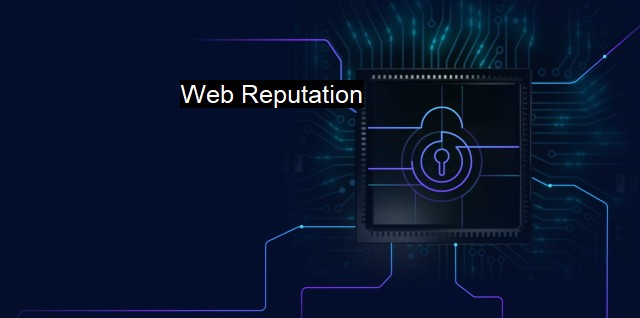What is Web Reputation?
Protecting Your Devices and Data: Understanding the Importance of Web Reputation in Cybersecurity and Antivirus
In the digital age, a comprehensive understanding of Web Reputation is crucial in maintaining a secure internet setting. Web Reputation refers to a system based on meticulous algorithms where evaluation is conducted on sites to determine their level of potential risk. Each website's reputation score is calculated by analyzing heaps of data housed by vast cyber networks equating to billions of internet addresses. This method functions to combat anticipated threats posed by potentially harmful websites on the Internet, both old and new.The proliferation of digital platforms has not only facilitated seamless operations for business firms or consultancies on a global scale but, simultaneously, has posed an open threat to uncompromised data usage. Given the rising numbers of advanced online malware and virus attacks, web reputation is becoming increasingly significant to ensure personalized security.
Web Reputation takes into account variables such as the website's direct user feedback, the site's history, including former documented attacks originating from the site, downloaded files' safety, and transactions happening within the site. By investigating these aspects, it assesses if a site is clean, compromised, or outright harmful.
An element that verifies Web Reputation's paramount role in cybersecurity is rooted in how threats have evolved. Advanced malware and viruses are more complex and, hence, harder to identify, requiring vast knowledge databases to track and respond. Potentially harmful websites have the capability to disguise as legitimate; they can cloak dangerous content in seemingly ordinary web content. These Geistesblitz-attacks are challenging to predict and block; the surveillance characteristics of Web Reputation could possibly allow for prediction and blocking.
Web Reputation security benefits are substantial and optimized with the layered approach. Other antivirus shields are complemented by the addition of thorough health checks of visited websites. This combined approach incorporates existing antivirus protection, integrating it with the more advanced heuristics, resulting in heightened sensitivity towards unusual activity. It is an amalgamation of protections and precautions, not just against known threats but also new and emerging ones.
Web Reputation systems maintain a dynamic database by constantly scanning URLs to identify detected behaviors. They allocate reputation scores based on risk-level, updating these in real-time based on the system's present understanding of the risk. An invaluable asset of web reputation systems is their capability, once detecting dubious files, to block downloads as part of their 'in-line file inspections'.
Powerful Web Reputation systems such as those incorporated by McAfee and Symantec considerably engineer into their models to provide well-rounded security solutions. Such advanced systems function by examining links on web pages and checking those against known repositories of harmful sites. Their effectiveness is evidenced by reduced calls to IT Help DeskJobs, minimal network downtime, and direct intervention before a user clicks on a malicious link.
One important thing to note about Web Reputation is its insufficiency to work as a standalone. The intention isn't to surpass firewalls, intrusion detection systems, spyware scanners, or antivirus software. Rather, the Web Reputation system is to serve as an additional protective layer working in conjunction with these existing protections. Its function lies in minimizing website risks to improve the reliability, efficiency, and security of online systems.
In the swiftly changing space of cybersecurity, Web Reputation plays a crucial role in maintaining a secure digital environment. Its purpose is to protect individuals and businesses from pernicious digital threats that loiter within the online forte. As online threats continue to advance, the importance of a dynamic, supportive, and effective Web Reputation system rises in tandem. It ensures a vital front-line defense contributing immensely to the fortress keeping the Internet (and by extension, the world) safe.

Web Reputation FAQs
What is web reputation?
Web reputation refers to the evaluation of the trustworthiness and safety of a website or web resource based on its historical behavior and security performance.Why is web reputation important in cybersecurity?
Web reputation is important in cybersecurity because it helps to identify potentially malicious websites and resources that may pose a threat to users' devices or personal information. It enables antivirus software to block access to such sites and prevent users from downloading harmful content.How is web reputation measured?
Web reputation is measured by analyzing various factors such as website traffic, domain age, number of backlinks, hosting location, and server configuration. Reputation scoring systems use complex algorithms to evaluate these factors and assign a reputation score to each website or resource.How can I check the reputation of a website?
You can check the reputation of a website by using online tools such as Google Safe Browsing, Norton Safe Web, or McAfee SiteAdvisor. These tools analyze the website's reputation score and provide information on potential security risks associated with the site. It is also advisable to use an up-to-date antivirus software that can block access to potentially harmful websites.| | A | | | B | | | C | | | D | | | E | | | F | | | G | | | H | | | I | | | J | | | K | | | L | | | M | |
| | N | | | O | | | P | | | Q | | | R | | | S | | | T | | | U | | | V | | | W | | | X | | | Y | | | Z | |
| | 1 | | | 2 | | | 3 | | | 4 | | | 7 | | | 8 | | |||||||